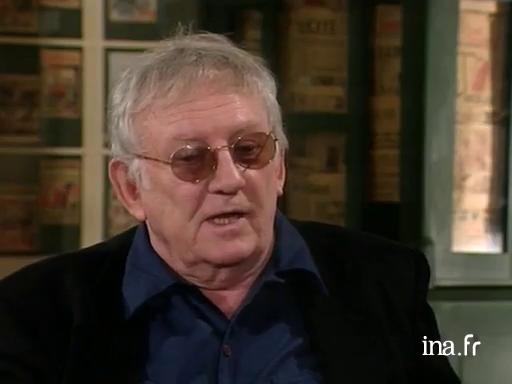Michel Field
Writers, my invited writers, and I will begin with you Hugo Claus.
You are the only Flemish writer in this assembly, and undoubtedly one of the greatest writers of the Dutch language.
We know your "Sorrow of the Belgians", which was a tremendous success, a certain number of other books that were published in France, with Fayard and with De Fallois, one that I particularly like is called "Desire".
And you write novels, short stories, but are also a poet, you write for the theatre, as well as screenplays, you were a member of CoBrA, because your pictorial activities complete this resume.
So, a first question that I would like to ask, is why this diversity in creative talents, and why these in particular?
Hugo Claus
Because I am quickly bored, so I change genre, because the idea of having to hold myself to one line induces terrible boredom.
So it is simply the fact that I cannot really do only one thing at a time.
There are two types of authors, those that dig a furrow and work hard to find their own psychology and their soul. Then there are those that change, that are a bit frisky and that think that their soul, perhaps they will meet it somewhere.
So, I belong to this second type, the playful type, and so I need a variety of sensations.
Michel Field
So sometimes one feels like the precision of a work of art, of situations that can be drawn, that you can write, and finally your painter's eye is at the disposition of your work as a writer.
Hugo Claus
Oh, I hope not!
No, no, because not only do I write, I direct, I also tap dance, but all this cannot relate to the other, because otherwise, there is an osmosis, a soup in which I would die.
Michel Field
So when we evoked a while who with the filmmakers who were here this linguistic scission in Belgium.
You, who are so Flemish, what does it have to do with anything, and how is it lived for a writer like you, this problem of language?
Hugo Claus
Me, I adore the fact that Belgium which, in parentheses, does not exist, exists by means of two communities.
And that in Paris you make fun of the Belgians, and that in Amsterdam they also make fun of the Belgians.
It's very very good for a writer, for an artist, to find oneself a sort of pariah, as someone who does not belong to a country.
I think it is very healthy.
For that reason, I see my country at a distance, I travel quite a bit in order to avoid becoming rooted in the beautiful Flemish land that I love greatly but that bores me deeply.
Michel Field
And is it also this situation that makes that we find a sort of ironic distance, sometimes even turned against you, but...
Hugo Claus
Oh yes, not only irony, but irony is rather French. No, it is sarcasm.
It is a much more virulent laugh, it is not very refined.
We are not, we have very little of the Parisian spirit. Parisian lightness scares us a bit.
Because there must be a lot hidden underneath these subtle and sufficient laughs.
Michel Field
Whereas sarcasm...
Hugo Claus
Whereas sarcasm,
Michel Field
and sniggers hide nothing.
Hugo Claus
It is the axe, yes.
Michel Field
The flamboyance also of your style, is something that often recurs when speaking of elsewhere, that is this way of...
I am thinking of "Desire", for example, with those moments of true verbal delirium that you reproduce, it is something that, that wants to put movement into a too monotonous landscape?
Hugo Claus
No, it is because I believe that there are these feelings towards reality, there is the shame of existing, there is everything that, these things that we drag behind us, and that we also try to make ourselves flamboyant, as iridescent as possible.
Perhaps we want to throw ourselves into beauty in order to forget.
Michel Field
To forget what?
Hugo Claus
Oh the infinite desert where we wander, and where we clumsily seek our soul.
I am doing some Claudel at the moment.
To please you.
Michel Field
But you do please me.





